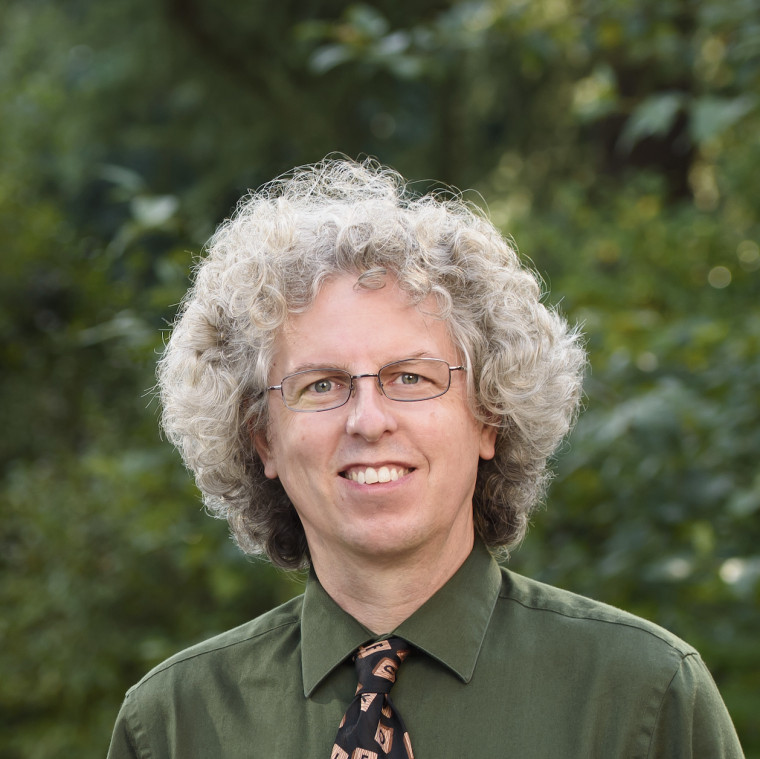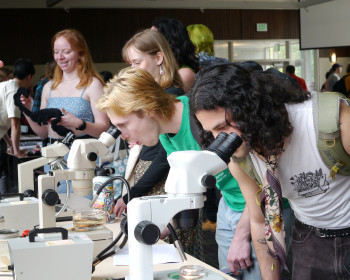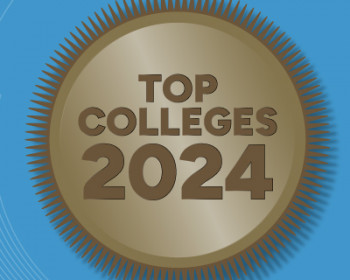Peter Drake
It is challenging to learn to use sophisticated tools and wrestle with difficult problems in game design and software development. I enjoy exploring these things in conversation with our students, who bring diverse perspectives and positive energy.

Pronouns
Title
Department(s)
What three words would you use to describe Lewis & Clark?
Rogers Summer Science Research, July 2023
Tell us about your summer research.
Our interdisciplinary project asks what motivates 18–29-year-olds to prepare for disaster. Specifically, we’re building a series of video games that focus on the looming Cascadia Subduction Zone earthquake and exploring their effectiveness.
How did you become interested in your research topic? What sort of real-world implications does your research have?
After many years writing artificially intelligent programs to play the classical Asian game of Go, that problem was famously cracked by AlphaGo. When I was in the market for a new research project, Associate Professor Liz Safran reached out to me about becoming involved in this one. It sounded like a fun challenge with positive real-world effects.
The practical implications are clear. There will be another devastating Cascadia Subduction Zone quake—we just don’t know when. Getting people prepared will save lives and reduce misery in the weeks and months afterward.
How are students involved?
The computer science students I work with are building the games themselves. This is a massive feat of software engineering—larger than anything that happens in a class. It is also in some ways a quintessential liberal arts project, involving aspects of computer science, art, theater, writing, geology, mathematics, rhetoric and media studies, and psychology.
Additional students, supervised by Associate Professor Erik Nilsen, run the psychological experiments (where people play these games, fill out surveys, and meet in focus groups) and analyze the resulting data.
What would prospective students find most interesting about this research?
Many students are interested in game development; some hope to go on to work in this field. The opportunity to apply computer programming skills to a real-world problem is also attractive.
What do you enjoy most about collaborating with Lewis & Clark students?
It is challenging to learn to use sophisticated tools and wrestle with difficult problems in game design and software development. I enjoy exploring these things in conversation with our students, who bring diverse perspectives and positive energy.
How does Lewis & Clark/this summer research experience prepare your students for a career and/or advanced studies after graduation?
There are some concepts and syntax (grammar) to learn in programming, but what students need most is practice. Working on a project like this full-time in the summer builds confidence, communication and organization skills, and an awareness of both best practices and difficult edge cases that one can’t get from reading a textbook.
What should incoming students know about L&C?
You’re not alone. Talk with your peers, the faculty, and the staff. Ask for help and, where you can, give it.
What sets your department or program apart from other small liberal arts colleges?
Computer science is part of the Department of Mathematical Sciences. Having both of those fields, as well as statistics, represented in one hallway makes it easy to reach out for help or collaboration.
Academically, our strengths are in software development, AI and machine learning, graphics, cybersecurity, and formal methods of program verification. We offer an optional concentration in cybersecurity and a minor in data science. L&C has a supercomputing cluster that is unusually powerful for an institution of this size.
Our department is particularly friendly. Faculty doors are open and there are always students working in the lounge and the computer labs. We have several regular social events, including a hike, a pumpkin carving contest, and a board game party.
How do you describe the liberal arts?
I think the liberal arts are about solving interdisciplinary problems. For example, computer science isn’t just about the formal, technical aspects of creating a correct and efficient program. You also have to think about the consequences of the software you’re building, which could draw from fields like philosophy, history, and gender studies. Things you learn about writing in English courses will make your programs better in your CS courses, and vice versa.
What brought you to L&C?
My partner and I both grew up in the area and have family nearby.
What’s your favorite spot on campus?
Perhaps the outdoor basketball court where the Fire Arts club meets.
What’s your favorite thing about living in Portland?
Portland believes in democracy and diversity.
What’s your most cherished L&C memory?
Probably the “Chinese Food and German Board Games” parties I hold at my house every semester. These have paused during the pandemic but should resume soon.
Share something you think your students would be surprised to learn about you.
I was an English major as an undergraduate.
More Admissions Stories
Admissions is located in Frank Manor House on the Undergraduate Campus.
MSC: 32
email admissions@lclark.edu
voice 503-768-7040
fax 503-768-7055
Vice President of Admissions and Financial Aid
Eric Staab
Admissions
Lewis & Clark
615 S. Palatine Hill Road MSC 32
Portland OR 97219

